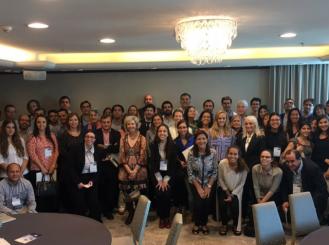May 10, 2017
By Carmen Borges Jacobs, RN, BS, CCRP, OCN
University of Texas MD Anderson Cancer Center
In 2011, I was attending a Southwest Oncology Group (SWOG) meeting in Chicago. During one of the sessions I attended, Oncology Nursing Society (ONS) staff announced that ASCO was looking for an oncology research nurse who was fluent in Spanish, to collaborate on a clinical trials workshop in Uruguay that was being organized by ASCO and the National Cancer Institute (NCI). I was fortunate enough to be chosen from among many other applicants, and soon found myself participating in my first International Clinical Trials Workshop (ICTW), in Punta del Este, Uruguay.
I presented to physicians attending the workshop about the role each member of the oncology research team played in the implementation, management, and success of clinical trials. I also chaired a breakout session with the nurses and research coordinators. However, my main goal was to share with everyone the value of having an oncology nurse as a member of the research team, while at the same time elevating the status of the nursing profession in these countries. I believe my goal was achieved, as during various portions of the workshop I was approached by both physicians and nurses from Uruguay and Argentina, who told me how pleased they were with my presentation and the information I had shared.
I was invited back to present at four subsequent ICTWs in the following years: the next in Sao Paulo, Brazil, followed by Santiago, Chile, and after that in Cordoba, Argentina. Most recently, in March 2017, I returned to Uruguay, this time to Montevideo, to participate on my fifth ICTW in South America. As the years have passed, my participation in the workshop has expanded, as my responsibilities, experience, and knowledge grew in my place of employment. I have shared in my presentations how to prepare and plan for an audit, project management, Good Clinical Practices (GCP), confidentiality and data management, the elements of informed consent, and several other topics. All of these topics are important, but I still take time to emphasize the role each member plays in the success of a clinical trial and the importance of a multidisciplinary team, not only in the practice of standard patient care but in the management of clinical trials.
One of the successes of this year’s workshop was the result of a dedicated session exclusively for nurses. In this session, nurses learned about clinical trials and the crucial role they have to play in their success. Previous workshops had never featured such a dedicated session for nurses. I also took great pleasure in reconnecting with some of my colleagues whom I had met at the very first ICTW in Punta del Este, and hearing about the progress they had made in the field. I learned that nurses had been empowered enough that they had brought many ideas to their Ministry of Health. I had the honor of meeting with the dean of the School of Nursing at the Universidad de la Republica. She shared with me how they had developed a curriculum for a graduate degree in oncology nursing and they were waiting for the accreditation of the program in the very near future.
The majority of attendees at these workshops are young clinicians. They do not have much experience in clinical trials. Not many nurses are able to attend these workshops, but those that attend want their voices heard and desire to become an integral member of the oncology research team. All present had the desire to learn how to conduct clinical trials and to make a difference in their country. Notably, all of the previously mentioned ASCO ICTWs took place in collaboration with local oncology societies. In these cases, the sponsor has been the Federacion Latinoamericana de Sociedades de Cancerologia (FLASCA). The diligence, effort, and hospitality of FLASCA President, Dr. Lucia Delgado Pebe is noted and appreciated. She has been instrumental in bringing the role of the research nurses to light in Uruguay. From the very first workshop, it was evident she shared an understanding of the value of the nurse’s role in clinical trials.
Nurses have always been known as patient advocates and educators. We are there for our patients and make sure their rights are protected; we hold their hand when they need us, and we explain to them what they do not understand about their care. Patients with cancer feel overwhelmed with their diagnosis, and with all the information that comes along with their treatment. Nurses have the opportunity, by sharing their knowledge, utilizing their skills, and caring for their patients, to help restore some of the control those patients may feel has been taken away from them. In order to empower our patients, we need to empower ourselves. One way to become empowered is through knowledge. The ICTW has definitely empowered the nurses that have attended these workshops. By sharing my experiences, my knowledge, and my clinical skills, I hope to have contributed to the growth of my colleagues in South America.
Personally, my experiences in these workshops have been impactful and very gratifying. I know I am a better person, a better nurse, and a better patient advocate because of my experience in each one of these ICTWs in South America. Learning firsthand our differences and similarities, particularly the common goals in patient care that my South American colleagues and I share, has been both an inspiring and humbling experience.
Ms. Jacobs is the research nurse supervisor in the Department of Neurosurgery at MD Anderson Cancer Center in Houston. She has been involved in clinical trials for 17 years and is a Certified Clinical Research Professional (CCRP). She is a member of the Oncology Nursing Society (ONS) and their Low Middle Income Countries (LMIC) Think Tank committee group.

